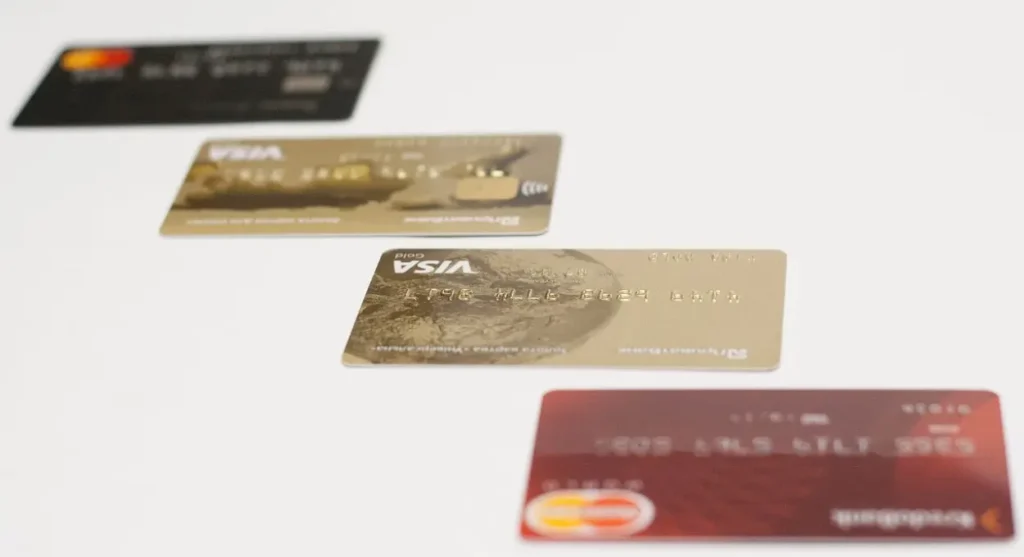For most students, managing finances is difficult. However, using student credit cards can also build a credit history and teach responsible money management.
Introduction: Smart Credit Cards for Students in 2025
“College students waste $2,500+ annually on essentials—2025’s best student credit cards can turn those purchases into free rewards.“
The right student credit cards in 2025 do more than build credit—they actively pay you back. With 63% of students now using credit cards (Sallie Mae 2024 data), smart cardholders are earning:
- Free flights through travel rewards,
- $300+ yearly cashback on dining and textbooks,
- Exclusive student discounts at Amazon, Spotify, and more.
Why 2025’s Student Credit Cards Stand Out
This year’s best options offer unprecedented perks:
- Higher sign-up bonuses (Up to $100 cash for good grades)
- Better dining rewards (4% back at campus eateries)
- AI-powered spending insights (Track budgets via banking apps)
In this 2025 guide, you’ll discover:
- 5 game-changing cards (including new fintech options)
- How to graduate with excellent credit (750+ scores)
- Redemption tricks travel bloggers don’t share
Your wallet deserves an upgrade—let’s find your perfect 2025 match.

Why Every College Student Needs a Rewards Card in 2025
1. Build Credit Early (The Smart Way)
A student credit card is your fastest path to strong credit if used responsibly. Unlike debit cards, these cards:
- Report to all three credit bureaus (Experian, Equifax, TransUnion)
- Help establish a 5+ year credit history by graduation
- Qualify you for better rates on student loans and apartments
Pro Tip: Keep utilization below 10% and always pay on time (see our Credit Score Guide for more).
2. Earn on Essential Spending
2025’s best student credit cards reward what you already buy:
- 4% cashback on dining (meal plans, campus cafes)
- 3% back at bookstores (textbooks, supplies)
- 2% on transit (Bus passes, Uber to class)
3. Avoid Common Student Traps
- Not all cards are equal—steer clear of:
- High APRs (28 %+) – Always pay your full balance
- Annual fees – Rarely worth it for students
- Foreign transaction fees – Crucial for study abroad
Safety Net: Many 2025 cards offer $0 fraud liability and free FICO scores.
Top 5 Student Rewards Cards for 2025
Finding the right student credit card can earn hundreds of rewards while building credit. Here are the best options for 2025, carefully selected for their rewards value and student-friendly features.
1. Discover it® Student Cash Back – Best for Rotating Bonuses
Rewards:
- 5% cashback on rotating quarterly categories (Amazon, gas, grocery stores)
- 1% back on all other purchases
- Cashback Match™ – Discover doubles all rewards earned in your first year
Student Perks:
- $20 annual Good Grades Reward (GPA 3.0+)
- No annual fee or foreign transaction fees
Best For: Students who want high rewards in specific spending areas.
2. Capital One SavorOne Student – Best for Food & Entertainment
Rewards:
- 3% cashback on dining, entertainment (Spotify, movie tickets)
- 2% back at grocery stores
- 1% on everything else
Student Perks:
- No annual fee
- No foreign transaction fees (great for study abroad)
Best For: Students who eat out often or attend campus events.
3. Bank of America® Travel Rewards Student – Best for Flexible Travel
Rewards:
- 1.5X points on all purchases
- 25,000-point sign-up bonus after 1,000spendin90days(≈1,000spendin90days(≈250 in travel)
Student Perks:
- No annual fee
- Points redeemable for flights, hotels, or cashback
Best For: Students who want travel rewards without restrictions. (Compare to premium travel cards if you spend more.)
4. Chase Freedom® Student – Best for Credit Building
Rewards:
- 1% cashback on all purchases
- $50 bonus after first purchase
Student Perks:
- Credit limit increases every 6 months with responsible use
- Free credit score tracking
Best For: Students new to credit who want a simple rewards structure.
5. Deserve® EDU Mastercard – Best for International Students
Rewards:
- 1% cashback on all purchases
- Free Amazon Prime Student for 1 year ($59 value)
Student Perks:
- No SSN required (accepts passport/visa)
- No annual fee or security deposit
Best For: International students building U.S. credit history.
Comparison Table
| Card | Best For | Rewards Rate | Sign-Up Bonus | Annual Fee |
|---|---|---|---|---|
| Discover it® Student | Rotating categories | 5% (quarterly) + 1% | Cashback Match | $0 |
| Capital One SavorOne | Dining & fun | 3% dining, 2% groceries | None | $0 |
| Bank of America® Travel | Travel rewards | 1.5X points | 25,000 pts | $0 |
| Chase Freedom® Student | Credit building | 1% back | $50 | $0 |
| Deserve® EDU | International students | 1% back | Amazon Prime | $0 |
How to Maximize Your Student Credit Card Rewards in 2025
Getting a great student credit card is just the first step—these pro strategies will help you earn 2-3X more rewards while avoiding debt.
1. Use for Fixed College Expenses
Turn unavoidable costs into rewards:
- Meal plans (3-5% back at campus dining halls)
- Streaming subscriptions (Spotify, Netflix)
- Textbook rentals (Buy online for extra portal rewards)
Smart Move: Set up autopay for bills to never miss rewards (learn more in our Budgeting Guide).
2. Always Pay On Time (The 2 Golden Rules)
- Pay the full balance monthly (Avoid 18-28% APRs)
- Never miss a due date (Late payments hurt credit + forfeit rewards)
Pro Tip: Enable text/email reminders 3 days before payment is due.
3. Stack with Student Discounts
Double-dip your savings by combining:
- Credit card rewards (typically 1-5% back)
- Student-exclusive discounts (often 10-30% off)
Real-World Example:
Let’s say you’re buying $50 jeans:
- First, apply your 20% student discount (50−2050−2040)
- Then pay with a 5% cashback card (5% of 40=40=2 back)
- Final net cost: **40−40−2 = 38∗∗(vs.original38∗∗(vs.original50)
Where to Find the Best Stackable Deals:
- Campus bookstores (Often offer student pricing + take credit cards)
- Tech retailers (Apple Education Store, Microsoft Student Deals)
- Fashion outlets (ASOS, J.Crew Student Programs)
- Food delivery (Uber Eats Student, DoorDash Student)
Pro Tip: Always ask retailers, “Do you offer a student discount?” even if not advertised – many do!
This stacking strategy works especially well with cards like:
- Capital One SavorOne (3% dining/entertainment)
- Discover it® Student (5% back on quarterly categories)
2025 Bonus Strategy: Mobile Wallet Boosts
- Add your card to Apple Pay/Google Pay
- Many cards now offer an extra 1% back for contactless payments
Pitfalls to Avoid With Student Credit Cards
1. Never Carry a Balance (The APR Trap)
2025’s student credit cards charge up to 28.99% APR—that’s:
- **29interest∗∗ona29interest∗∗ona100 balance carried for just 1 month
- **145+yearly∗∗ifyoumaintaina145+yearly∗∗ifyoumaintaina500 average balance
Smart Alternative:
✔ Use cards like debit cards (only spend what you can pay off)
✔ Set up balance alerts at 10% of your limit
2. Avoid “Easy Approval” Sprees
Each credit card application causes:
- A hard inquiry (drops your score 5-10 points)
- Lowered average account age (hurts long-term credit)
2025 Application Rule:
➔ Apply for 1 card every 6-12 months max
➔ Pre-qualify first (soft checks don’t affect scores)
Bonus 2025-Specific Traps
- “Buy Now, Pay Later” integration (Tempting but risky)
- Dynamic APR changes (Some cards now adjust rates monthly)
FAQs About Student Credit Cards
1. “What’s the minimum credit score needed?”
Most student credit cards are designed for no/limited credit history. You typically need:
- No minimum score (approval based on income/school status)
- No co-signer required (unlike some regular cards)
2. “Can international students qualify?”
Yes! Options like:
- Deserve® EDU Mastercard (No SSN needed)
- Bank of America® Travel Rewards Student (Accepts ITIN)
3. “Do these cards have annual fees?”
Nearly all student cards have $0 annual fee—including:
- Discover it® Student
- Capital One SavorOne Student
- Chase Freedom® Student
4. “How do I build credit fast?”
- Pay on time (35% of your FICO score)
- Keep utilization under 10%
- Avoid closing your oldest account
5. “Can I upgrade after graduation?”
Yes! After 6-12 months of good use:
- Discover → Discover it® Cash Back
- Capital One → Venture Rewards
- Chase → Freedom Unlimited®
6. “Do rewards expire?”
- Bank points (Chase/Discover): No expiration
- Store-specific rewards: Often expire in 12-24 months
7. “No credit history? Start here:”
- Secured cards (link to secured vs. unsecured guide)
- Authorized user status on family accounts
Conclusion: Start Earning Rewards While You Study
You’re now equipped with everything needed to choose and use student credit cards wisely in 2025. Let’s recap:
Key Takeaways
- Pick the right card for your spending habits (cashback, travel, or credit-building)
- Maximize every purchase by stacking rewards with student discounts
- Avoid costly mistakes like carrying balances or applying for too many cards
Your Next Steps
- Compare our top picks and apply for 1 card
- Set up autopay to never miss a payment
Remember: The financial habits you build in college will impact your post-grad life. Start strong today!
Final CTA:
“Your perfect student credit card is waiting—apply now and turn your campus spending into real rewards!”

